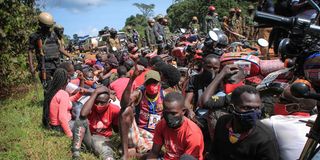Premium
Uganda tightens screws as election looms

Members of Bobi WIne's presidential campaign sit during their arrest on a road as the campaign was blocked by Uganda People's Defence Forces in Kalangala district in December 2020.
Nairobi
Tear gas, midnight arrests, threats and intimidation – the tactics employed every election cycle in Uganda are familiar to all who dare challenge President Yoweri Museveni's 35-year grip on power.
But even those accustomed to such heavy-handedness say the crackdown ahead of elections on January 14 is extreme, even in a country consistently ranked "not free" by democracy watchdogs.
Journalists have been attacked, lawyers jailed, election monitors prosecuted and opposition leaders violently muzzled using coronavirus laws.
The brazenness has startled Uganda's allies, with the United States warning last month of "consequences for those who undermine democracy".
"Across the board -- not just for people who work on human rights issues -- repression has intensified," said Oryem Nyeko, a researcher with Human Rights Watch in Uganda.
"Things have gotten increasingly worse as the elections have come closer."
Rebel leader
Museveni is seeking a sixth term in office, unbound by the constitution after parliament removed presidential age and term limits. The 76-year-old has claimed every election since taking power as a rebel leader in 1986 – almost all marred by irregularities and violence.
Civil libertarians say what little room existed for dissent in past polls has shrunk to near-vanishing point this time around, further tilting an already grossly unequal playing field.
Amnesty International says special campaign rules ostensibly imposed to contain the coronavirus pandemic have been "weaponised" to browbeat the opposition – most notably the charismatic young presidential aspirant and chief Museveni rival, Bobi Wine.
Where Museveni's supporters have been permitted to gather in large numbers, Wine's rallies have been broken up with tear gas and baton-wielding police on the pretence of protecting public health, Amnesty said.
Manu detentions
The popstar-turned-MP has been detained countless times for apparent violations of Covid-19 regulations, pulled off the campaign trail and placed under house arrest. One such incident in November sparked protests in which at least 54 people were shot dead by security forces.
The election commission cited coronavirus concerns when suspending campaigning this month in Kampala and several other districts. Wine, who hails from the capital and enjoys popular support there, called the decision "cowardly" and a sign of regime panic.
The flagrant use of lawfare – bending the law to silence critics – by Ugandan authorities was singled out last month by United Nations special investigators.
Suspended alliance
In October, a government regulator indefinitely suspended an alliance of election monitoring groups, branding it "illegal". Two months later, four non-governmental organisations working on election processes were accused of financing terrorism, and their assets were frozen.
The country's best-known rights lawyer, Nicholas Opiyo, has been charged with money laundering, a case that has drawn condemnation from around the globe.
Opiyo's prosecution and "the judicial harassment of those who express dissent appears to be strictly related to the electoral context, and fictitious charges being used to justify them," said the panel of UN special rights rapporteurs in late December.
Opiyo, who has advised Wine at times, was granted bail on December 30.
But the arrest of such a high-profile government critic on apparently spurious charges shocked even veteran rights defenders.
It's not targeting criminality. It's targeting the opposition.
Stephen Tumwesigye from Opiyo's non-profit law firm, Chapter Four Uganda, said harassment and intimidation were expected come election time, but arresting and charging lawyers was something unique.
"I think it is rather extreme," he told AFP.
This election is also the first for which Ugandan police have at their fingertips an extensive, newly completed CCTV surveillance system equipped with powerful facial-recognition software from Chinese telecoms giant Huawei.
Museveni has hailed this surveillance network as a modern-day crime-fighting tool. But critics say it has served a more sinister purpose this election, allowing police to track and detain protesters and to closely monitor opponents.
"It's not targeting criminality. It's targeting the opposition," said Dorothy Mukasa from Unwanted Witness, a Ugandan cyber-advocacy group.
Journalists' walkout
In December, journalists in Kampala, some wearing bulletproof vests, staged a walkout from a government press conference in protest after two colleagues were shot covering opposition rallies.
"This is not indiscriminate fire," said the Foreign Correspondents' Association of Uganda, citing a "consistent pattern of attacks" on media workers by security forces.
The Ugandan telecoms regulator wrote to YouTube's parent company Google in December to request the blocking of Wine's YouTube channel Ghetto TV, citing concerns over national security.
Just weeks before the election, meanwhile, foreign reporters have been deported, and press accreditations have been torn up, with all journalists told to reapply.
The crackdown "exposes an unacceptable willingness to sacrifice the safety of journalists and the public's right to information for the sake of censoring coverage" of the elections, said Muthoki Mumo from the Committee to Protect Journalists.





